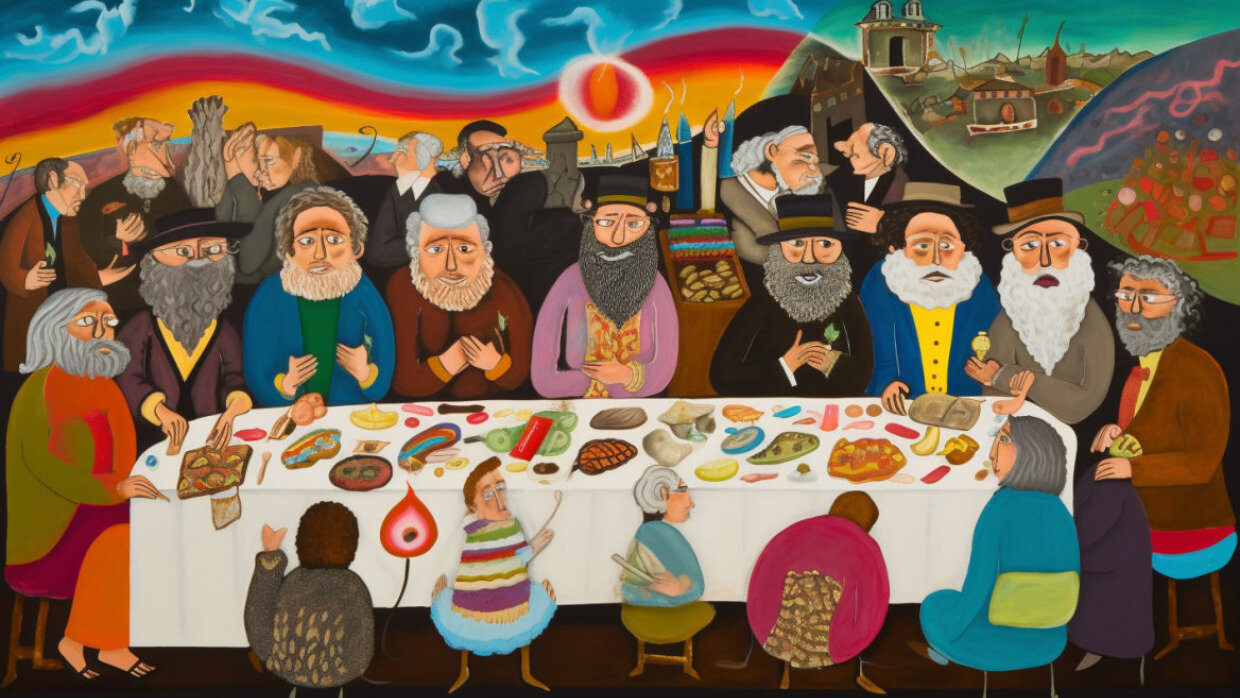 Iran’s Attack on Israel
Iran’s Attack on Israel


5 min read
The Passover Seder is about crafting your own story, right now, using the events of history as our vocabulary.
In his autobiography "Long Walk to Freedom," anti-apartheid activist Nelson Mandela writes about how he and his fellow inmates used storytelling as a way to lift their spirits in the face of cruelty and oppression. From memories of his childhood, where he learned the value of hard work and cooperation, to tales of African culture and history, which inspired a sense of pride and identity among the prisoners, he used the power of a story to reshape his experience of the present.
Mandela was tapping into something essential about the nature of human experience. The field of narrative psychology argues that stories are fundamental to the way we understand the world. We situate the events of our lives within a narrative, and that narrative becomes the lens through which we interpret our experiences. We can literally change the courses of our lives by changing the stories we tell ourselves.
But stories are not only tools for reshaping our individual selves. As Mandela realized, they are also a powerful bond that pulls us together into families, communities, and societies. Legendary filmmaker Steven Spielberg probably experiences this phenomenon more regularly than most:
“The most amazing thing for me is that every single person who sees a movie, not necessarily one of my movies, brings a whole set of unique experiences, but through careful manipulation and good storytelling, you can get everybody to clap at the same time, to hopefully laugh at the same time, and to be afraid at the same time.”
Spielberg realized that somehow, despite our obvious differences, stories have the power to cut through it all and touch a shared element of our experience. Somehow, everyone can find themselves in a good story.
But why? What makes stories so compelling? What gives them their special power to transform dry facts into a moving moral lesson?
These questions bothered me, until I stumbled upon an insightful quote from philosopher Hannah Arendt: "Storytelling reveals meaning without committing the error of defining it."
The process of storytelling shows how there is an underlying meaning that unites them, leaving space for discovery and interpretation.
Organizing isolated events into a narrative, the process of storytelling shows how there is an underlying meaning that unites them. But a story is not a maxim or a proverb. It is participatory, leaving space for discovery and interpretation.
Judaism champions the importance of storytelling, but nowhere is this participatory element more apparent than in the Passover Seder. The Jewish sages instruct that in every generation, we are required to view ourselves as if we personally came out of Egypt. Such a requirement seems unrealistic, until we recall the unique nature of the Seder.
Often, when we talk or read about history, we attempt to transport ourselves backwards in time, to inhabit a world long past. But on Passover, we encounter the events of the past on our terms. It is the past that must be transported to meet us, and we accomplish this by becoming active storytellers. We do not merely recount the events; we pose questions about them and grapple with novel answers.
But this can only work when the questions are our questions and when the answers resonate with our own depth of experience. We find ourselves in the story, not because the story defines its own meaning, as Arendt recognized. The story reveals the presence of a meaning that we must discover ourselves, within our unique contexts and perspectives.
Think about it – we each have a certain understanding of what the terms “freedom” and “slavery” mean, and we bring these understandings with us into the Passover Seder. They contextualize our reading of the story and imbue it with an emotional resonance that may be unique to our generation.
For contrast, imagine how a Jewish family living in Soviet Russia or Nazi Germany might have experienced this story. Quietly reciting the Passover Haggadah in secret, they lived in fear of a government that was bent on eradicating their religious practice. Or we can go even further back in time and imagine a Jewish family living in America during the era of the Civil War. Whether they resided in the North or the South might have profoundly shaped their experience of the Seder.
While each of these generations recited the same words, they each told a different story. Much like Mandela’s stories in the prison on Robben Island, our personal narratives become the lenses through which we interpret the past in order to find meaning in the present. The Passover Seder isn’t about recounting someone else’s story – it’s about crafting our own story, right now, using the events of history as our vocabulary.
The events of Passover offer us a particularly rich vocabulary in this respect. Ideals like hope and resilience permeate the story, but it might be our unique conception of freedom that has done the most to unite Jews throughout history. While many nations have desired freedom from something, the Jewish slaves in Egypt wanted freedom for something. Their freedom was for the sake of actualizing an ideal – a nation that would represent justice, compassion, and all of God’s lofty hopes for mankind. As Moses repeatedly told Pharaoh, the Jews were leaving Egypt, not to escape hard work, but to begin a new spiritual mission in the desert.
The Jewish people has spent most of its history scattered among diverse languages and cultures, but when we share in the process of self-discovery that is the Passover Seder, we find ourselves drawn together by this special understanding of freedom. Our freedom is an opportunity, a means towards a better future. As we begin to craft our own stories on Passover night, we share a uniquely Jewish vision for what that future could be.
